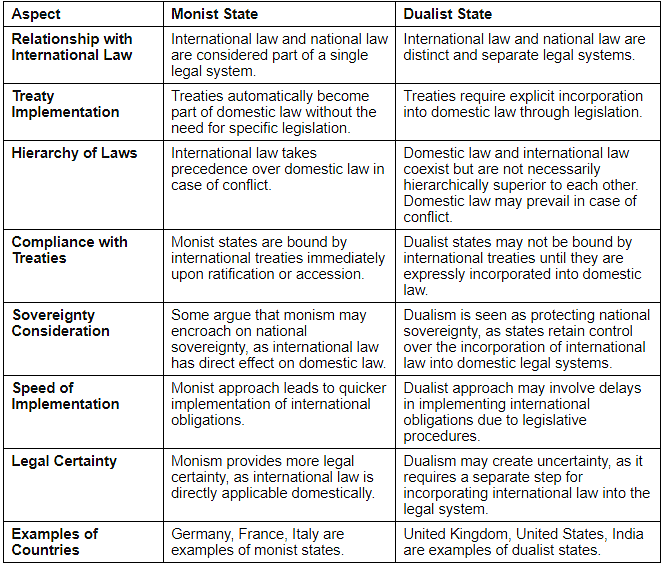Monist and Dualist State Approaches to International Law | Legal Reasoning for CLAT PDF Download
| Table of contents |

|
| Introduction |

|
| The Monist Approach |

|
| The Dualist Approach |

|
| Application in Practice |

|
| Challenges and Considerations |

|
Introduction
The distinction between monist and dualist states is significant in determining how nations integrate and enforce international treaties and agreements within their domestic legal systems. The monist and dualist approaches represent divergent philosophies that dictate the interaction between international law and national law.
A comprehensive understanding of these approaches is essential for grasping how states engage with the global legal framework.
The Monist Approach
In the monist approach, international law and national law are considered integral components of a unified legal system. This implies that when a state enters into an international treaty or agreement, it inherently becomes applicable to its domestic legal system without the requirement for explicit incorporation. Essentially, in the event of a conflict, international law takes precedence over national law.
Advantages of the Monist Approach
- Rapid Implementation: The monist approach facilitates swift and efficient implementation of treaty obligations as international law seamlessly integrates into the national legal system, eliminating the need for prolonged legislative processes.
- Uniformity and Adherence: Given that international law holds precedence over domestic laws in the monist approach, it promotes consistency and adherence to international obligations, simplifying the fulfillment of treaty commitments by states.
The Dualist Approach
In the dualist approach, international law and national law are perceived as discrete and independent legal systems. For an international treaty to be integrated into the domestic legal system, it necessitates explicit transformation or incorporation through the enactment of domestic legislation. In this framework, the application of international law within the national legal system requires specific legislative enactment and cannot occur directly.
Advantages of the Dualist Approach
- Protection of Sovereignty: The dualist approach protects a state’s sovereignty by allowing it to decide which international treaties to adopt into its legal system. This provides more control over the incorporation process.
- Flexibility: Dualist states can choose which parts of international law they wish to incorporate, ensuring they are not bound by all provisions of a treaty if they deem some aspects inappropriate for their legal system.
 |
Download the notes
Monist and Dualist State Approaches to International Law
|
Download as PDF |
Application in Practice
Many states align with either the monist or dualist approach, and some may adopt a mixed approach that incorporates elements from both systems. Certain states exhibit a monist inclination by incorporating international treaties into domestic law automatically through constitutional provisions.
On the other hand, particularly in common law countries, the dualist approach is observed. Under this approach, the adoption of international law necessitates specific legislative acts.
Challenges and Considerations
Both the monist and dualist approaches have their merits and challenges. While the monist approach ensures quicker implementation and compliance with international obligations, it may raise concerns regarding national sovereignty and potential conflicts with existing domestic laws. On the other hand, the dualist approach provides greater control over the incorporation process but may lead to delays in implementing international commitments.
Below is a table comparing the Monist and Dualist approaches to the incorporation of international law into the domestic legal systems of states:

|
112 videos|162 docs|44 tests
|






















